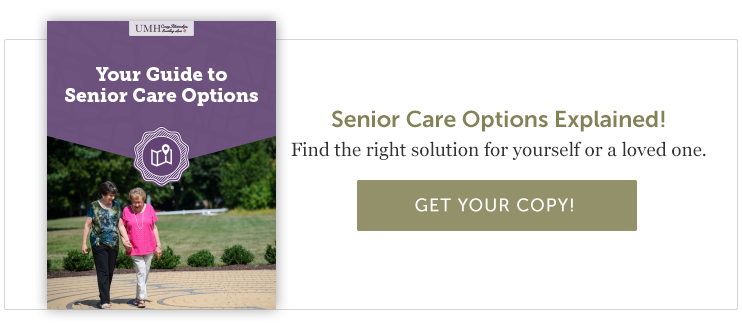Social Isolation Series, Part 2: Helping Seniors Stay Connected
assisted living communities in ct | Independent Senior Living | dependent senior living
In our last post, Social Isolation Series, Part 1: Identifying Triggers for Loneliness in Seniors, we introduced the need to address some of the most pressing challenges facing seniors during the current global health crisis and widespread isolation measures. With acute loneliness endangering both the mental and physical health of older adults, it’s important to focus on getting the information you and your loved ones need to navigate this difficulty effectively.
The first installment of our Social Isolation Series focused on the major contributors to severe loneliness in seniors as they are impacted by unprecedented social distancing rules and recommendations. With that foundation of understanding regarding triggers, it’s time to uncover some specific prevention opportunities. This combination of insight and action can support you or an aging loved one in dealing with the new realities of living in our current health and social environment.
The Urgency to Mitigate Loneliness in Seniors
“Humans have an inherent desire to be with other people, and feelings of loneliness or isolation have several detrimental effects on a person’s well-being,” explains a recent PscyhCentral article. “It might be tempting to say that loneliness is nothing more than a feeling, but researchers have found that it can be deadlier than obesity.”
It is critical to prioritize your emotional health or that of the senior in your life so as to prevent the associated physical and mental outcomes. Here’s what the data reveals about the correlation between loneliness and health:
- Studies show that seniors who’ve reported loneliness also reported high levels of functional decline, meaning ability to perform daily activities such as dressing and bathing, ability to perform upper extremity tasks, ability to walk and ability to climb stairs.
- A comparative analysis of lonely and non-lonely seniors found that the lonely seniors also suffered from various medical conditions at a higher rate, including hypertension, diabetes and heart conditions. Isolated seniors were also about 28% more likely to suffer from depression.
- A study from the University of Chicago found that loneliness can significantly affect someone’s blood pressure, particularly when they are older. It can actually increase a person’s blood pressure by up to 30 points.
- A study from psychologist Steve Cole and professionals from UCLA School of Medicine, University of California at Davis, and University of Chicago found that loneliness causes abnormalities in the body’s monocytes, a white blood cell that helps defend the body against infection. Social isolation causes the monocytes to stay immature, which results in diminished immunity.
All of this is to say that there’s a real and present urgency to mitigate loneliness for yourself or an elderly loved one. Doing so can significantly affect a number of mental and physical realities.
14 Ideas for Promoting Connection and Wellbeing
Here are some valuable opportunities to consider in your efforts to prevent unhealthy levels of loneliness and isolation within yourself or an older adult in your life. These are ideas you can employ even in the midst of the COVID-19 outbreak and the need to quarantine or practice social distancing.
- Check in on aging loved ones regularly via phone or video chat. Ask about how they are doing, what challenges they’re facing, how their routine has changed and how they’re coping with fear and stress.
- Express gratitude and appreciation for your relationship with them to help support their sense of purpose. Ask them for their opinion or guidance, or tell them what you admire about them. Everyone needs to feel like they have a contribution to make, so frequently remind your aging loved one how important he/she is to you.
- Offer to drop off groceries or other essential items, cook them a meal or take their pet for a walk (if allowed within their community). Be sure to give them a warm smile or wave through the window.
- Seek professional advice or medical care (or encourage them to do so) whenever there are signs of experiencing a decline in physical or mental health.
- Focus on physical activity to whatever degree makes sense for you or the senior in your life. This might include walking, stretching, practicing yoga or working out to exercise routines found online.
- Take advantage of creative outlets, like music, art, crafting, reading, writing, woodworking, sewing, gardening, DIY projects and more.
- Engage in online opportunities for learning, including recorded lectures, virtual classes and other self-study models.
- Tap into spiritual opportunities, such as prayer, meditation, religious rituals or live-streaming services.
- Kick up the level of fun and engagement with cognitive games and exercises, such as puzzles, sudoku, online chess or cards.
- Set up virtual get-togethers for the whole family or group of friends to enjoy a meal, have a happy hour, conduct a book club or simply catch up with one another. There’s a myriad of options for connecting this way, including platforms like Zoom, Google Hangouts, Facebook Messenger and more.
- Keep the mind and hands busy with cooking and baking. Try recipes that require extra time and attention, and experiment with new options.
- Keep in touch by writing letters or sending emails. Or think about connecting with the inner self through journaling.
- Dive into a genealogy project or work on assembling a family tree.
- Consider ways to volunteer or support others from home, whether it be sewing masks, making meals or any other form of service that enables you to participate from a distance while still having a meaningful impact.
Accepting the Challenge to Think Outside the Box
“Social distancing doesn’t have to mean isolation or loneliness,” says Dr. Alicia Arbaje, Associate Professor of Medicine at the Johns Hopkins University School of Medicine. “We need to keep older adults safe, but also keep in mind that social isolation can have a negative impact on older people’s immunity and mental health.”
In a recent Johns Hopkins Medicine article, Dr. Arbaje encourages seniors to think outside the box in terms of connecting with others—and not just their usual circle of friends and family: “Saying hello to the mail carrier or checking in on neighbors close by can add to a sense of connectedness.”
We’re living in an unprecedented time, navigating challenges we’ve never faced before. Now’s the time to think beyond the norm to find ways to stay connected and overcome loneliness in the face of social isolation. It’s more important than ever for seniors to prioritize their emotional health and receive the kind of outreach that makes life more manageable and fulfilling.
In our next installment of the Social Isolation Series, we’ll continue this critical discussion and provide even more helpful information for seniors and their loved ones.
For information about what the team at United Methodist Homes Assisted and Independent Living is doing to address concerns related to COVID-19, please check out our most recent update and guidance or call us directly at (877) 929-5321.
About Elizabeth Bemis
In 1998, I drove past an assisted living community construction site, learned that it was part of United Methodist Homes and realized the next stop on my professional journey was to work for a mission driven organization. Soon after, I joined the team as Executive Director of our Middlewoods of Farmington community and later served as Regional Manager for the Middlewoods properties before accepting my current role as Vice President of Marketing, Promotions, and Assisted Living Operations. I enjoy spending time with my family, cooking, reading, walking, and love working alongside our staff, residents, and families to build strong communities that reflect the mission, vision, and values of United Methodist Homes.

Our Blog is a 2016 Platinum Generations Award Winner! The Generations Award is an annual international competition for excellence in senior marketing recognizing professionals who have communicated to the 50+ Mature Markets.




